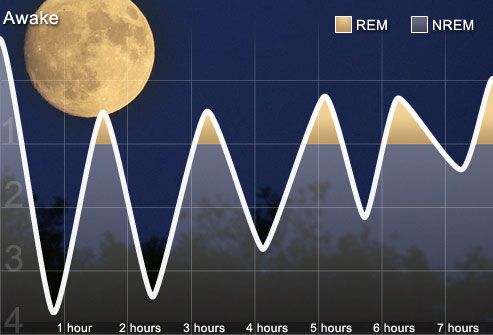
So, do you know why we don’t remember most of our dreams? It’s not a trick question. The basic answer is, most of our dreams are rather on the boring side, and just as we don’t remember every moment in our waking lives because sometimes it’s rather dull, our dream lives are also mostly just boring scenes and sights and sounds. There is also another good reason why we don’t remember some of our dreams. We dream in cycles. This is how the cycles work.
We have two basic states of sleeping. We either sleep with Rapid Eye Movement (REM) or No Rapid Eye Movement (NREM). We also have 4 stages of sleep, from light (stage 1) to deep sleep (stage 4) which we cycle through at various points during the night.

We start off with NREM and sleep for approximately 90 minutes before the first REM sleep cycle kicks in. I say approximate because our bodies are analog, not digital, so the number of minutes may vary from individual to individual depending on your inner sense of timing. The first REM sleep usually only lasts about ten minutes, and since it is at the start of our dream cycle, most often, we are not going to remember this dream sequence unless we are awakened in the middle of it by some external force like an alarm clock or someone physically waking us up.
The next 90 minute cycle of NREM is then followed by a longer REM sleep cycle, and each 90 minute cycle results in longer and longer REMS, with the NREM cycles hitting less and less of the deep sleep stages until we are barely asleep in the last couple of hours that we are sleeping.
If we happened to have a particularly exciting dream in the first half of the night, say around three hours into our sleep cycle, most likely we won’t remember it, or if we do, it will seem to be like a vague memory that we’ve been there and done that before, except it was in a dream state, and only as we are dreaming. If the last cycles of REM sleep are just boring scenes and nothing untoward is happening, then our minds won’t even bother trying to remember it because there is nothing about it that is all that exciting.
The real magic though, is turning our REM sleeps from a non-interactive visual situation where things happen to us, and change it into an interactive environment where we get to change the scripts and make some changes of our own so that we can enjoy it better. This is called Lucid Dreaming, and I’ve talked about it extensively in many of my other dream posts. There are methods with which we can use to make ourselves become aware that we are dreaming. After all, it is rather hard to know if we are really dreaming our lives or if we are actually awake. Sometimes, I have awakened from my dreams only to realize that I had dreamed I woke up. I only realized that the awakening was a dream once I really woke up.
The key to knowing whether or not we are in dream state is to see if anything concrete will change. A good exercise to try is to look at a digital clock. If there is no digital clock around, make one up. If it appears in front of us, we don’t even need to check what time it is. We’re in dream state all right. Now, let’s just say the clock is in front of us and we haven’t magically created it out of thin air. Take a look at the time. It doesn’t matter what the time is (it can be 2:93 for all we care) but we keep that number in our minds and then turn away. Turn back immediately, and if it is the same number, chances are, we are awake. However, I would be wary about a clock that shows the time as 2:93 since there are only 60 minutes in an hour. Irregardless, look at that time and try to change the numbers on the clock face. If we are dreaming, it should be easy. If we are not, we won’t be able to change the numbers at all.
Once we are able to change it, we will have known that we are in dreamland, and what’s even better, we KNOW we’re in dreamland. Now is where the fun begins. We can fly, we can conjure things up out of the air, we can do most anything you wish. It is all within our powers to do so.
Unfortunately, if the lucid REM episode happens earlier on in the night, we probably won’t remember it. However, if the good stuff hits at the last cycles of REM, that is when we can see and hear all the excitement and then remember them. That is when we can wake up with the scent of plumeria still in our noses and the flash of the summer sun still warm on our faces. This is when we grab our pens and jot down the impressions before they fly away, never to be retrieved again.



Lucid dreaming isn’t something I have or will have as I think I’ve mentioned before that I rarely dream or remember them, however have your heard of sleep paralysis? I had an event once and wrote about it here http://throughthemagicdoor.wordpress.com/2012/12/13/sleep-paralysis/ I thought you might be interested 🙂
LikeLike
I read in some research paper that everyone dreams, they just might not be able to remember them. If you go into a sleep lab and the researchers wake you at the REM sleep stage, you will be able to remember your dreams. I don’t think that you are necessarily missing out on huge advantages if you don’t dream, but it does add to life’s myriad of interesting experiences. I quite often enjoy many of my dreams. They are often like being a part of an interactive fantasy movie where anything is possible. Quite entertaining, really.
As for sleep paralysis: According to webmd.com “Sleep researchers conclude that, in most cases, sleep paralysis is simply a sign that your body is not moving smoothly through the stages of sleep.” It has happened to me a couple of times in my life. I just go back in and move psychically instead of physically and that works to get me back into the lucid dream so I can deal with the situation at hand. I just convince myself that I don’t need to move my body physically in order to make things happen.
LikeLike
That makes sense 🙂 I’ll remember that.
LikeLike